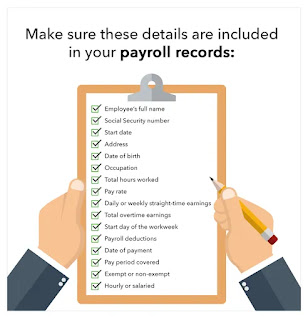Understanding the Importance of Paycheck Records in Financial Management
Introduction
In the realm of personal finance, keeping accurate and organized records is crucial for effective budgeting, tax compliance, and overall financial well-being. One key element of these records is the paycheck records, which serves as a comprehensive documentation of an individual's earnings, deductions, and other financial transactions related to employment. In this article, we will delve into the significance of paycheck records, exploring how they contribute to financial stability and providing insights into best practices for managing and maintaining these essential documents.
The Basics of Paycheck Records
A paycheck record, also known as a pay stub or payslip, is a detailed document provided by employers to their employees with each paycheck. It typically outlines essential information related to an individual's compensation for a specific pay period. The contents of a paycheck record may vary, but they generally include the following key elements:
1. **Employee Information:** This section includes the employee's name, address, Social Security number, and other identification details.
2. **Employer Information:** It provides details about the employer, such as the company name, address, and employer identification number.
3. **Pay Period:** Indicates the specific timeframe for which the paycheck is issued, whether it's weekly, bi-weekly, or monthly.
4. **Earnings:** Breaks down the various components of the employee's income, such as regular wages, overtime pay, bonuses, and commissions.
5. **Deductions:** Details any deductions made from the employee's gross income, including taxes, insurance premiums, retirement contributions, and other withholdings.
6. **Net Pay:** The final amount the employee receives after all deductions have been subtracted from the gross income.
7. **Year-to-Date (YTD) Totals:** Summarizes the earnings and deductions from the beginning of the calendar year up to the current pay period.
Importance of Paycheck Records
1. **Financial Awareness:**
Paycheck records serve as a valuable tool for financial awareness and literacy. By thoroughly reviewing these documents, individuals can gain a clear understanding of their income, tax obligations, and deductions. This awareness is crucial for making informed financial decisions and planning for future expenses.
2. **Budgeting and Expense Management:**
The detailed breakdown of earnings and deductions in paycheck records facilitates effective budgeting. Individuals can identify their fixed and variable expenses, allocate funds for savings, and plan for discretionary spending. This proactive approach to budgeting enhances financial stability and helps prevent overspending.
3. **Tax Compliance:**
Paycheck records play a pivotal role in ensuring tax compliance. They provide the necessary information for accurately filing income tax returns, including details about taxable income, withholdings, and other relevant financial transactions. Proper documentation through paycheck records reduces the risk of errors in tax filings and potential penalties.
4. **Verification of Accuracy:**
Regularly reviewing paycheck records allows employees to verify the accuracy of their earnings and deductions. Any discrepancies can be promptly addressed with the employer, ensuring that corrections are made in a timely manner. This attention to detail safeguards against financial errors and discrepancies that may go unnoticed if not promptly addressed.
5. **Loan and Credit Applications:**
When applying for loans or credit, financial institutions often require proof of income. Paycheck records serve as a reliable and standardized document to demonstrate an individual's earning history. Having well-maintained paycheck records can streamline the loan application process and increase the likelihood of approval.
6. **Employee Benefits and Retirement Planning:**
Paycheck records provide insights into employer-sponsored benefits and retirement contributions. Understanding these aspects is crucial for employees planning for their future, especially when it comes to retirement savings. The records help individuals track contributions to retirement accounts, such as 401(k) or pension plans.
Best Practices for Managing Paycheck Records
1. **Create a Dedicated Folder:**
Establish a designated folder, either physical or digital, to store all paycheck records. Organizing these documents in one place makes it easier to locate them when needed, especially during tax season or when applying for financial services.
2. **Regularly Review Paycheck Records:**
Develop a habit of reviewing paycheck records with each pay period. This practice allows for the early detection of any discrepancies or errors, ensuring that they can be promptly addressed with the employer.
3. **Digital Backup:**
Consider maintaining digital copies of paycheck records as a backup. This provides an additional layer of security in case physical copies are lost or damaged. Digital storage solutions, such as cloud services, offer accessibility and ease of retrieval.
4. **Understand Deductions:**
Take the time to understand each deduction listed on the paycheck record. This knowledge is crucial for identifying any unauthorized or incorrect withholdings. If there are questions or concerns, don't hesitate to seek clarification from the employer's human resources department.
5. **Update Personal Information:**
Ensure that personal information, such as address or tax withholding status, is up-to-date. Any changes in personal circumstances should be communicated to the employer to avoid discrepancies in paycheck records.
6. **Retain Year-End Statements:**
Keep year-end statements or summaries provided by employers. These documents typically include a comprehensive overview of earnings, deductions, and other financial transactions throughout the calendar year, simplifying the process of preparing annual tax returns.
Conclusion
In conclusion, paycheck records are integral to financial management, providing a detailed account of an individual's earnings and deductions. The importance of these records extends beyond the immediate benefit of ensuring accurate pay; they contribute significantly to financial awareness, budgeting, tax compliance, and long-term financial planning. By adopting best practices for managing and maintaining paycheck records, individuals can enhance their financial stability and make informed decisions about their money. Regular attention to these essential documents is a small yet powerful step toward achieving and sustaining financial well-being.

Comments
Post a Comment